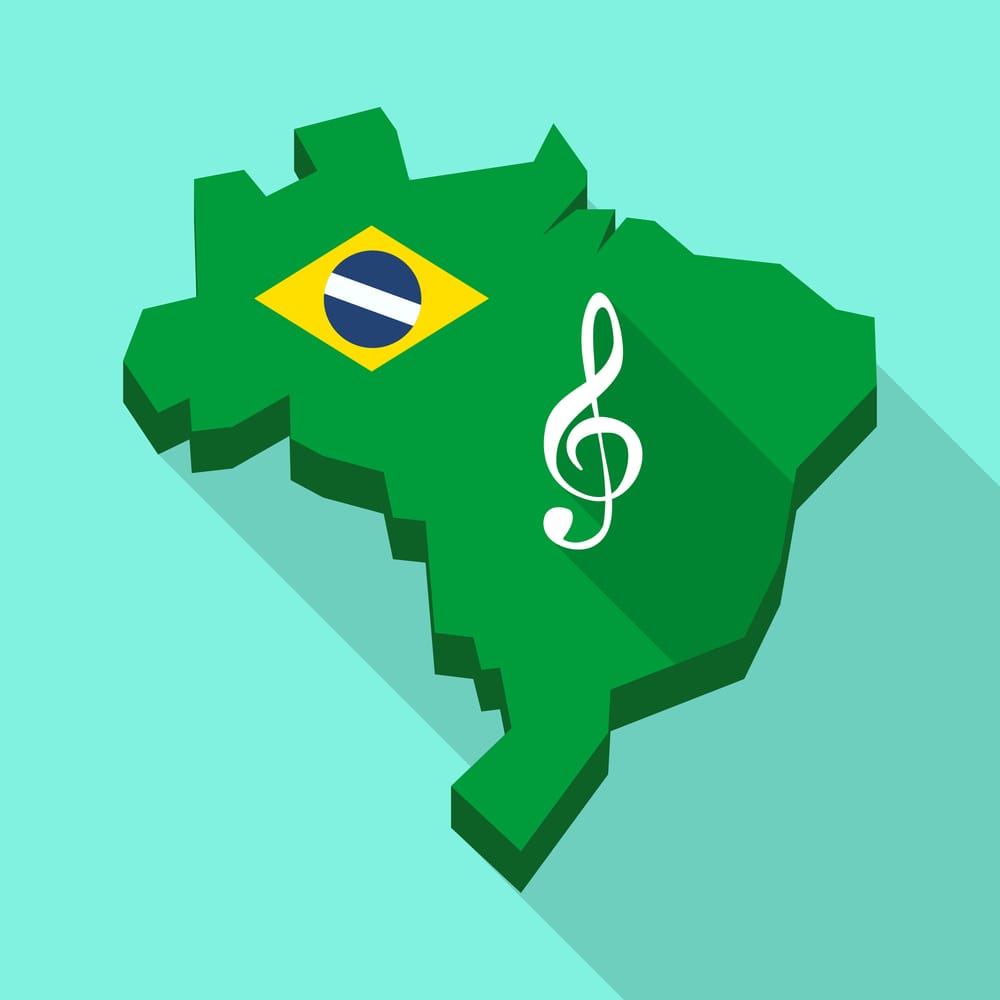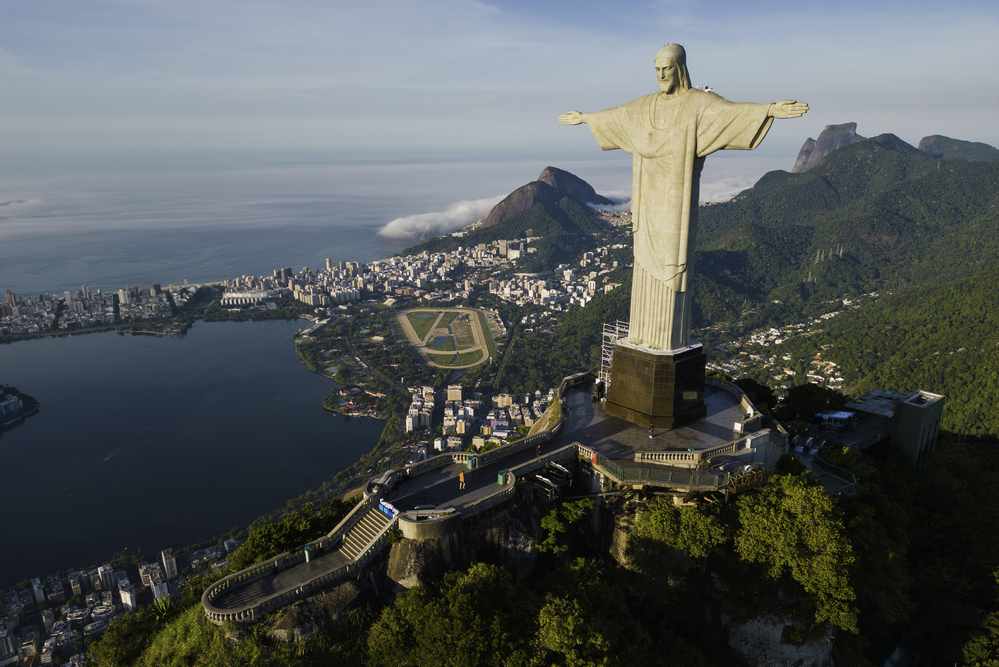Have you ever noticed how Brazilian music has a unique way of embracing you? Even if you don’t understand all the words, the rhythm wraps around you like a conversation between old friends. It’s as if Brazil has its own soundtrack, made to guide you through its colorful streets, vibrant beaches, and the warm hearts you’ll meet along the way.
When you hear a Brazilian song for the first time, it feels like it already knows you. The variety of these songs moves from one rhythm to another, from one culture to another, and in a different way of touching our soul. It can be a comforting touch, a peaceful hug, a memory of someone or something, or even a vibrant energy that leads us to fun and unique movements when we listen to the most famous Brazilian songs.
Where it all began
Brazilian music was born as a meeting of worlds. When the Portuguese arrived in Brazil, they brought their instruments and melodies. The Africans, brought as enslaved people, brought their rhythms and beats. And the Indigenous peoples already had their own sounds, connected to nature and rituals. It was as if three musical rivers met and formed a sonic ocean.
In the beginning, everything was improvised. Popular festivals mixed African drums with Portuguese guitars. Indigenous dances met religious chants. Little by little, unique styles emerged, like samba, which was born in the backyards of Rio de Janeiro. It was music made with the body, with the heart, with whatever was at hand. Until it became part of Brazilian culture.
Bossa nova came later, like a gentle breeze. It mixed samba with jazz and conquered the world. Then came forró, axé, and funk, which grew in other regions, each with its own story. It’s as if Brazil created a musical library where each style is a book full of emotion.
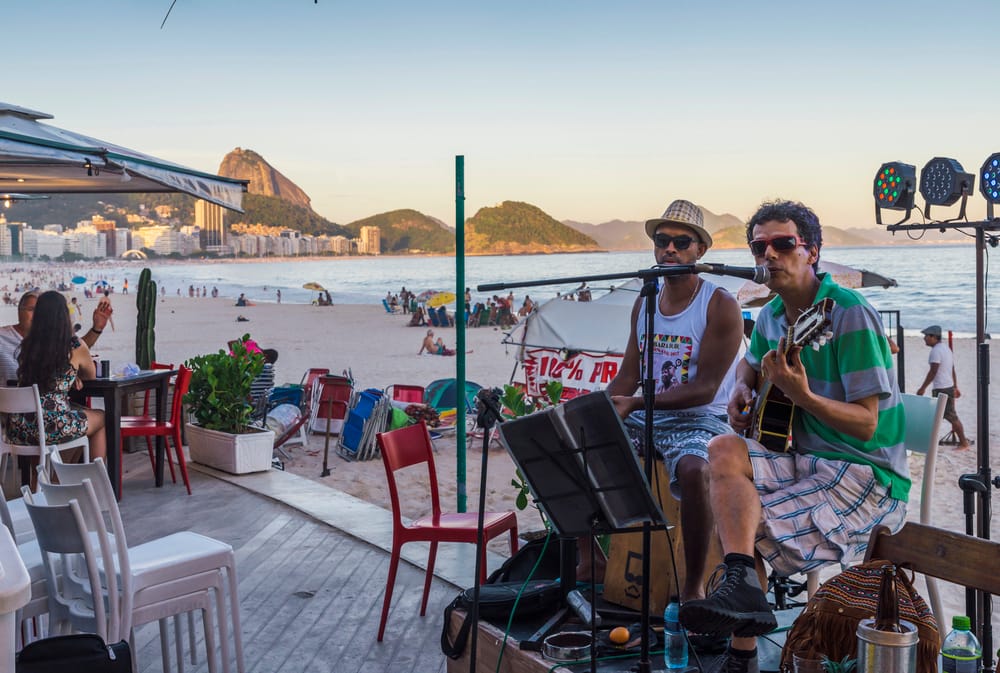
“Girl from Ipanema,” for example, is like that sunset you saw in Rio: gentle, beautiful, and impossible to forget. This song has been recorded in over 240 versions around the world. It’s almost like Brazil’s musical passport.
But it doesn’t stop there. There’s also “Ai Se Eu Te Pego,” which became a global craze. You’ve probably danced to this song somewhere, even without knowing it was born in a corner of Brazil. It’s like that outgoing friend who pulls you onto the dance floor without asking for permission.
And what about “Mas que Nada”? That one is pure swing. It mixes samba with bossa nova and even has a version with the Black Eyed Peas. It’s as if Brazil invited the whole world to a backyard party.
That’s Brazilian music: a bridge between cultures, an explosion of feelings, and a way to understand the country without needing translation. Every beat tells a story. And you, curious traveler, are about to discover that these stories go far beyond what you hear.
The most famous Brazilian songs
Now, if you think Brazil is all about samba and bossa nova, get ready for a surprise. The country is like a bubbling musical melting pot. There’s funk, forró, sertanejo, axé, MPB, pagode… each style with its own soul. And each one has songs that have marked generations.
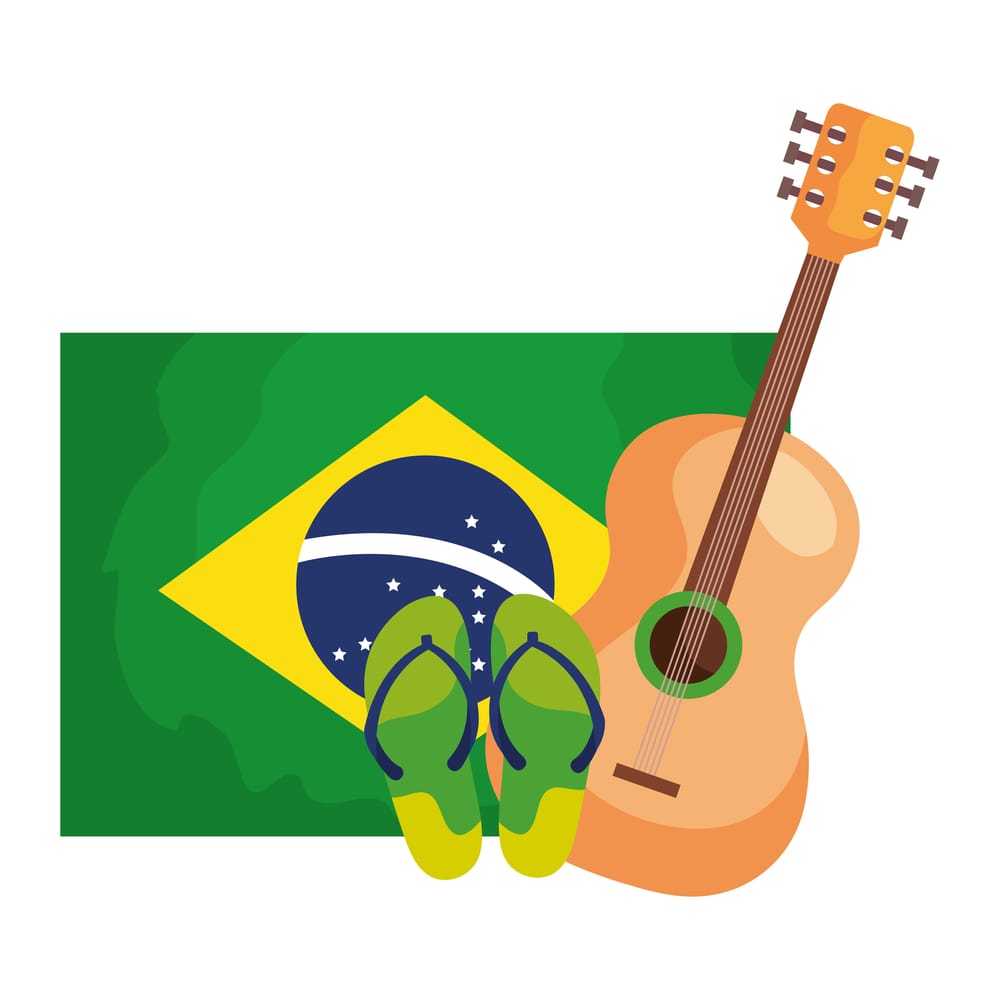
Classifications of the most famous brazilian songs by musical styles:
Funk
Think of funk carioca. It’s like the beating heart of Rio’s favelas. Direct, intense, full of beats that make the ground shake. “Baile de Favela,” for example, became an anthem at parties. It’s impossible to stand still. The rhythm is so contagious that even international DJs started mixing Brazilian funk into their sets.

“Bum Bum Tam Tam” – Mc Fiote
“Envolver” – Anitta
Sertanejo
Sertanejo is another giant. It’s like American country music, but with more drama and passion. “Evidências,” by Chitãozinho & Xororó, is practically a ritual. If you’re in a Brazilian bar and this song starts playing, get ready: everyone will sing along. Even those who say they don’t like it. It’s as if the song has a secret button that activates every Brazilian’s heart.
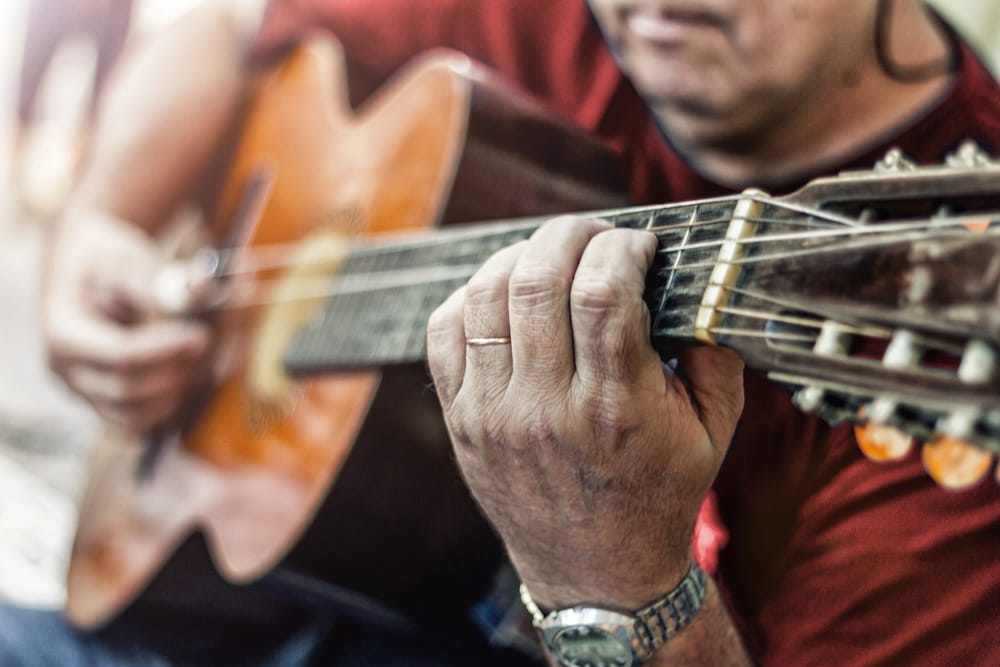
“Balada Boa” – Gustavo Lima
“Chora Me Liga” – João Bosco e Vinícius
Forró
Forró is the sound of Brazil’s Northeast. It’s like an invitation to dance close, with your heart beating to the rhythm of the triangle, zabumba, and accordion. Songs like “Asa Branca” by Luiz Gonzaga tell stories of love, longing, and resilience.
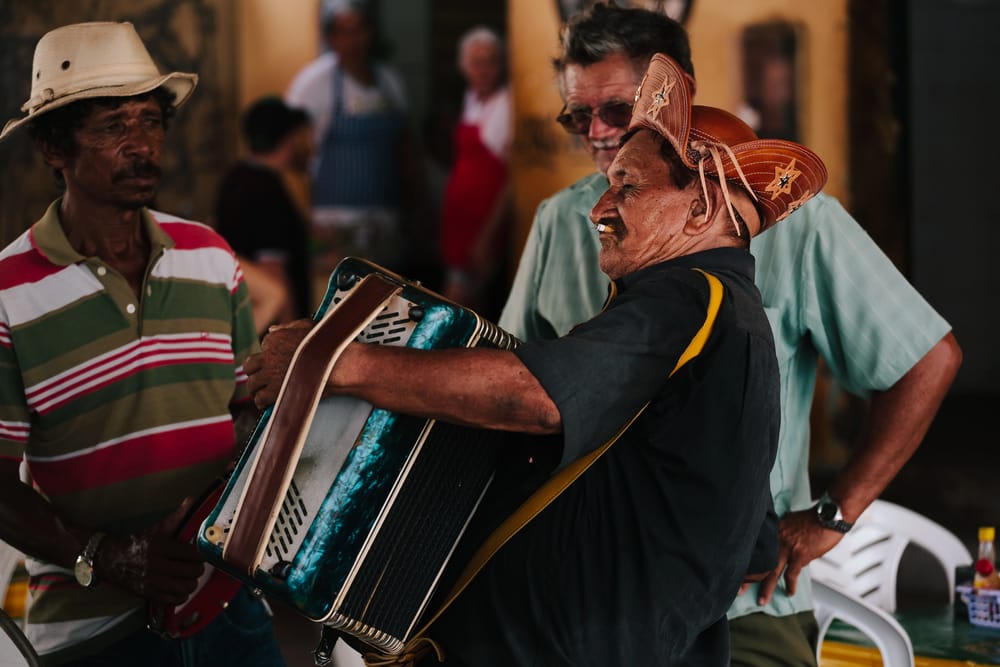
“Olha Pro Céu” – Luiz Gonzaga
“Eu Só Queria Um Xodó” – Dominguinhos
“La Belle De Jour” – Alceu Valença
“Você não Vale Nada” – Calcinha Preta
Axé
Axé is pure energy. It was born in Bahia and won over the entire country. “O Canto da Cidade” by Daniela Mercury was like a cry for freedom in the 1990s. “Rebolation” and “Lepo Lepo” are like invitations to dance without thinking. Axé is summer in the form of sound.
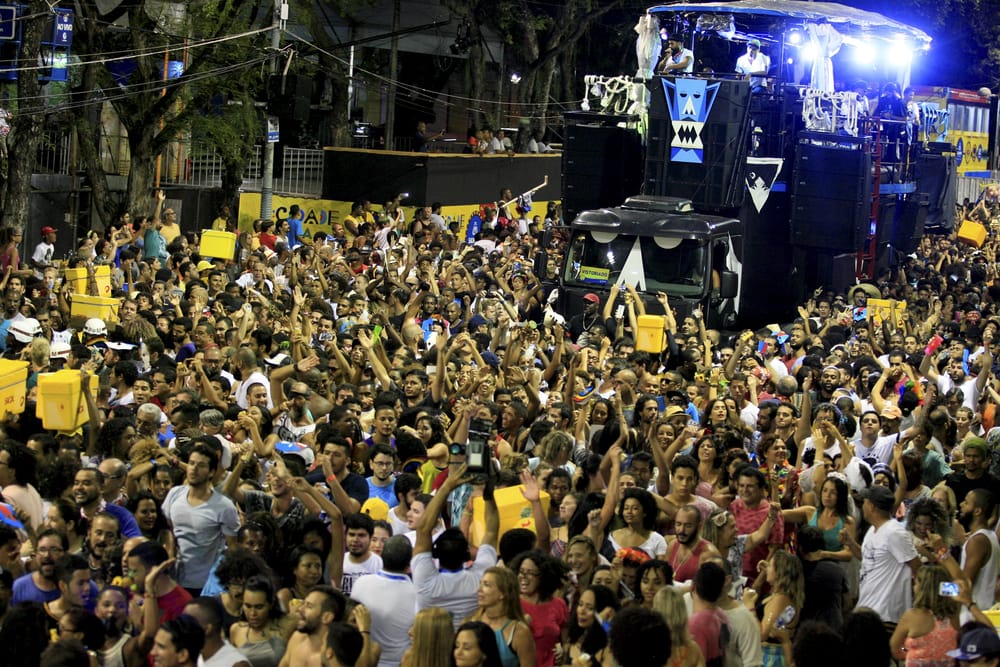
“Vem Meu Amor” – Banda Eva
MPB
MPB (música popular brasileira) is more introspective. It’s like a deep conversation by the sea. Caetano Veloso, Gilberto Gil, Elis Regina… these names are like musical monuments. “Como Nossos Pais,” for example, is a song that makes you reflect, even if you don’t understand every word. The emotion crosses the language barrier.
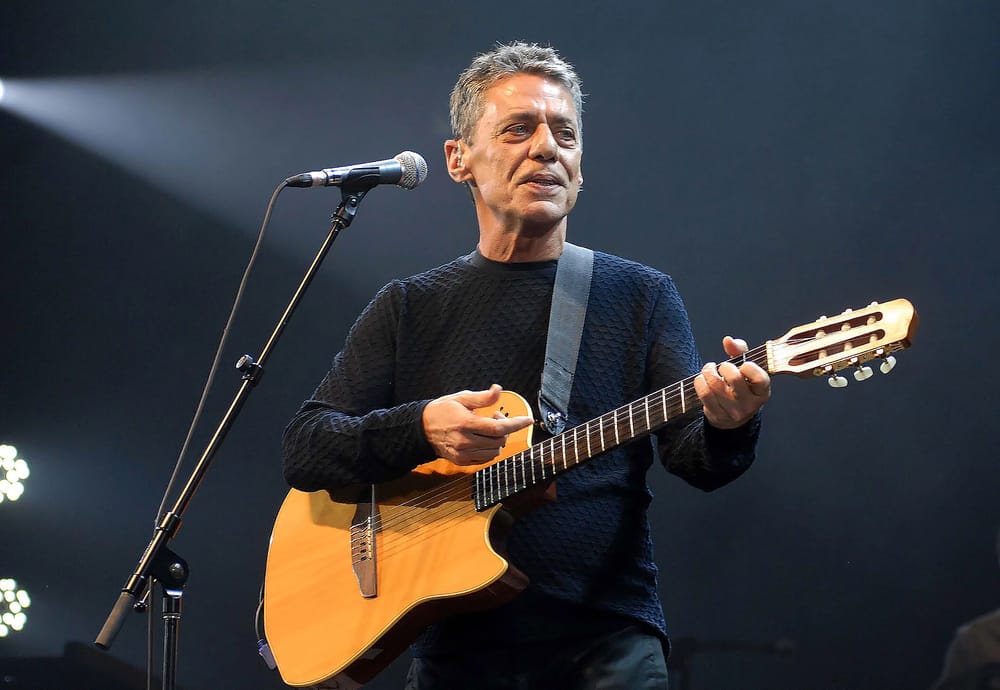
“Detalhes” – Roberto Carlos
“Andar com Fé” – de Gilberto Gil
“Carinhoso” – Pixinguinha
“Construção” – Chico Buarque
“Lanterna dos Afogados” – dos Paralamas do Sucesso
“Ai, Ai, Ai” – Vanessa da Mata
“Boa Sorte/Good Luck” – Vanessa da Mata com Ben Harper
“Alegria Alegria” – Caetano Veloso
Rock
Rock is more than just sound, it’s a cultural movement that shaped generations around the world. Born in the United States in the 1950s, rock blends rhythm, rebellion, and raw emotion. From The Beatles to Nirvana, its influence is global.
In Brazil and South America, rock found a unique voice, mixing local rhythms with electric guitars and powerful lyrics. Whether exploring urban festivals or small towns with hidden rock scenes, this genre offers an electrifying soundtrack for your travels. Check out the most famous Brazilian songs in the rock music style.
“Panis et Circencis” – Os Mutantes
“Faz Parte do Meu Show” – Cazuza
Bossa Nova
another one that deserves the spotlight is “chega de saudade” by João Gilberto. This song isn’t just famous, it’s historic. It was the starting point of bossa nova, a style that blended samba with jazz and changed everything. It’s as if someone dressed Brazil in a sharp suit without taking off its flip-flops. The softness of the voice, the calm rhythm, the sophisticated melody… everything about it is pure charm.
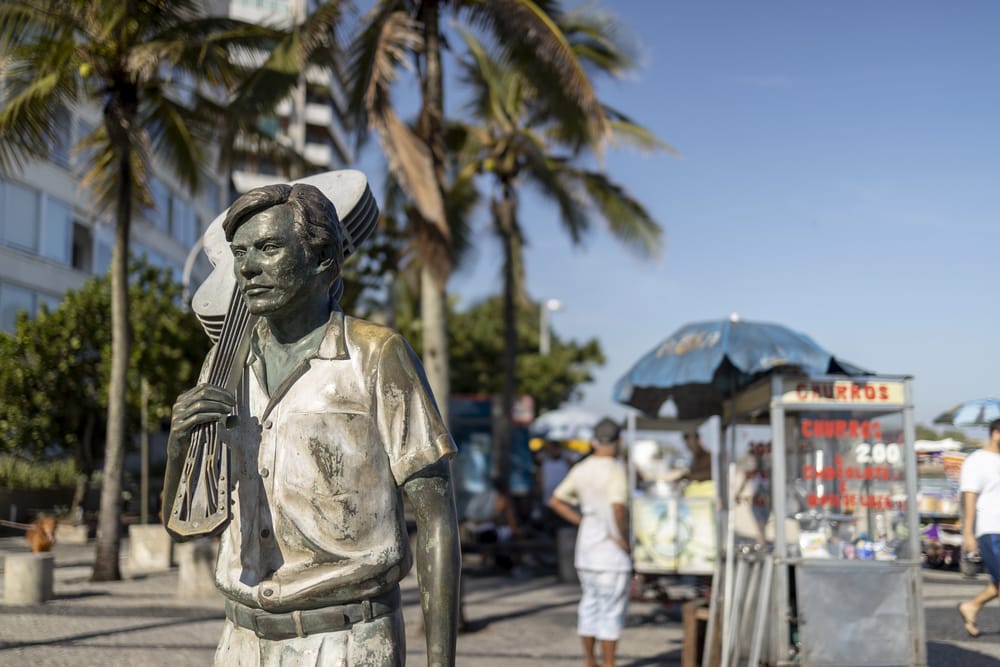
“Eu sei que vou te amar”, Vinicius de Moraes.
“Desafinado” – João Gilberto
“Águas de Março”, Elis Regina. Composition by Tom Jobim in 1972, it became known through his duet with Elis Regina in 1974.
Samba
If you find yourself in a samba circle, you’ll hear “O Mundo é um Moinho” by Cartola. This song is like a sad poem that slowly embraces you. Cartola wasn’t just a songwriter, he was a storyteller. And this track is one of his deepest. It speaks of choices, losses, and life. It’s as if he’s looking you in the eyes while he sings.
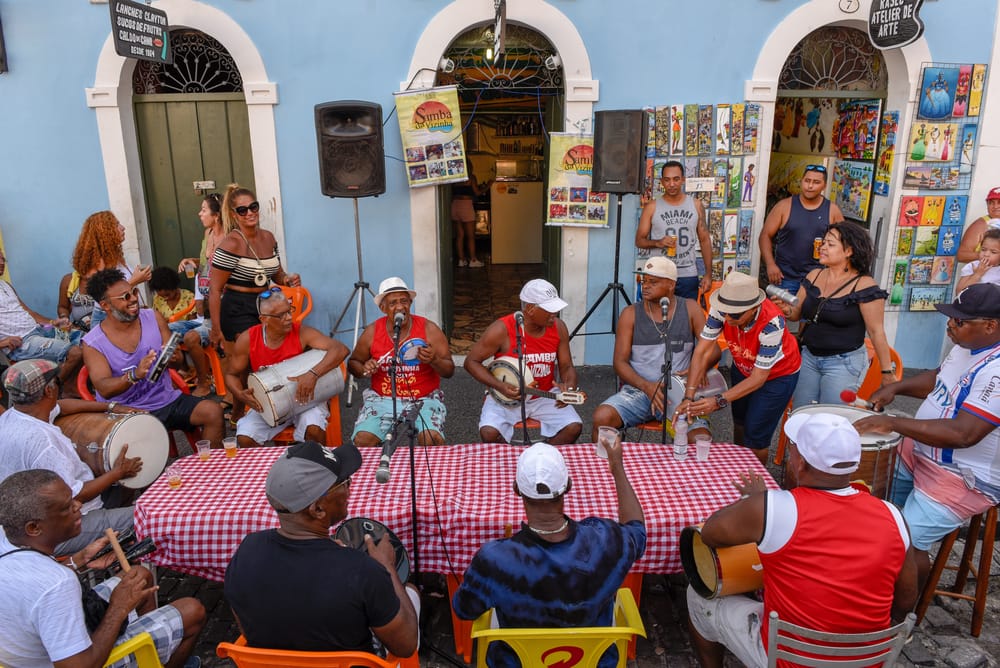
Você Abusou” – Antônio Carlos e Jocafi
“Mas Que Nada” – Jorge Ben
Blue
when it comes to joy, you can’t forget “taj mahal” by Jorge Ben Jor. This song has a fun curiosity: it’s said to have inspired “da ya think I’m sexy?” by Rod Stewart. The similarity was so strong that it even led to a lawsuit. But in the end, everything was resolved. It’s as if Brazil accidentally lent a piece of its creativity.
Marcha junina
This is a festive rhythm, known for being lively and danceable, and it’s characteristic of Brazil’s northeast. This musical style is a tribute to the traditional June festivals.
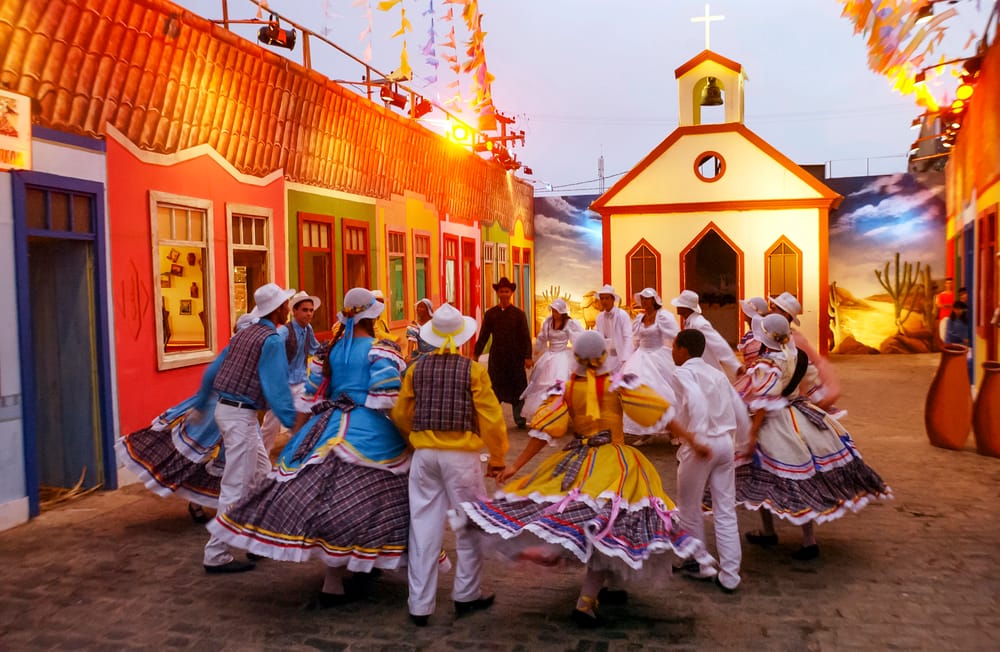
and if you find yourself at a São João party, you’ll hear “olha pro céu” by Luiz Gonzaga. This song is like a bonfire burning in your chest. It speaks of love, longing, and tradition. It’s rural Brazil singing with pride.
Pop
In Brazil and South America, pop takes on vibrant local flavors, blending samba, funk, and reggaeton into irresistible rhythms. Whether dancing at beach parties or exploring urban nightlife, pop is the perfect companion for your journey.
“Me Adora” – Pitty
Curiosities about brazilian music
If you want to understand the power of Brazilian music at parties, listen to “Parabéns pra Você” in pagode rhythm. Yes, even birthdays turn into celebrations with music here. It’s as if Brazil has a natural talent for turning any moment into a party.
Now, if the mood is festive, “Não Quero Dinheiro (Só Quero Amar)” by Tim Maia is the right choice. Tim is like the Brazilian James Brown. Powerful voice, striking presence, honest lyrics. This song is pure energy. When it plays, everyone sings along.
And we can’t forget “Festa” by Ivete Sangalo. This song is like an open invitation. When she sings, it feels like everyone becomes friends. Ivete is one of Brazil’s biggest stars, and her songs are like hugs in sound form.
“País Tropical” by Jorge Ben Jor is practically an informal anthem. When it plays, Brazilians smile. It’s as if the song reminds everyone that, despite the problems, Brazil is a place full of color, warmth, and hope.
Brazilian music has this ability to adapt to the moment. It’s like a custom-made outfit for your mood. If you’re sad, it comforts you. If you’re happy, it celebrates with you. If you’re thoughtful, it quietly keeps you company.
Many of these songs are passed down from generation to generation. Parents sing to children, grandparents to grandchildren. It’s as if each family has its own soundtrack. And when you listen, even as a foreigner, you feel like you’re part of something intimate.
The most famous Brazilian songs are: a mix of rhythms, stories, and feelings. And you, as a traveler, have the chance to experience all of this up close. Just listen carefully. Because in Brazil, music isn’t just art. It’s life.
Styles by region
Each corner of Brazil has its own sound. In the North, tecnobrega and carimbó dominate. In the Northeast, forró and frevo reign. In the South, vanerão and milonga have their space. It’s as if the country were a musical mosaic, where each piece has its own color and rhythm.
If you really want to understand Brazil, listen to its music. It will show you what books don’t tell. It will make you feel what your eyes can’t see. And it will connect you with people in a way no translation can.
Conclusion
Interestingly, many of these famous songs weren’t born in big studios. Some emerged in circles of friends, street parties, and improvisations. It’s as if Brazil had an invisible hit-making factory spread across the country.
And you know what’s most amazing? Many of these songs crossed borders without asking for permission. “Tieta,” “Aquarela do Brasil,” “Chega de Saudade”… they’ve been sung by artists from various countries. It’s as if Brazil exported feelings in the form of melody.
Want a comparison? The influence of Brazilian music in the world is like that of jazz in the United States. It’s respected, studied, admired. And at the same time, it remains alive in the streets, in bars, in popular festivals.
You’ll notice this when you’re traveling through Brazil. Music is everywhere. On the bus, at the market, on the beach, at the barbecue. It’s as if the country had an endless soundtrack that changes with the weather, the mood, and the region.
Frequently asked questions
What is the Brazilian song that everyone knows?
The Brazilian song that everyone knows is “The Girl from Ipanema.” This bossa nova classic, famous worldwide, captures the lighthearted vibe of Rio de Janeiro and is almost like a musical postcard from Brazil.
What is the most famous Brazilian rhythm?
The most famous Brazilian rhythm is samba. It was born in Rio de Janeiro and is closely linked to Carnival, with lots of dance, colors, and energy. Samba is the beat that best represents the joy and vibrant culture of Brazil.
Who is the most famous Brazilian singer?
The most famous Brazilian singer is Roberto Carlos. Known as the “King of Music,” he has a decades-long career with romantic songs that marked generations. His voice and style made him a cultural icon in Brazil and recognized in several countries.
